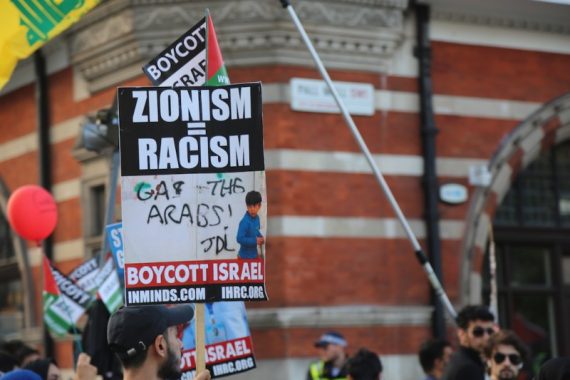T
he idea of a Jewish homeland in Palestine was implemented by the European secular Jewish elite in the 19th century. Fueled by anti-Semitism in Europe, the First Zionist Congress convened to bring this project to light. In keeping with the spirit of the times, Zionist ideas embraced colonialism. Like the early colonialists’ disregard for the indigenous peoples of the Americas, the Zionists viewed Palestine as an “empty land.”
Despite the inclusion of the Ottoman Empire in the Concert of Europe and the long history of Ottoman subjects there, wishful thinking persisted, driven by a singular goal: the elimination of the indigenous Palestinian population by any necessary means.
This colonialist mindset took root when the British invaded Palestine in 1917. Jewish underground organizations, particularly the Nili, undermined Ottoman authority and paved the way for the British invasion. With the advent of British colonial rule, Jewish colonialists flocked to Palestine, provoking reactions from the Palestinian population. The Nabi Musa riots of 1920 and the Jaffa riots of 1921 were the first to protest Jewish migration. Throughout British colonial rule in Palestine, there was a series of riots in protest of the establishment of new Jewish colonies.
British protection
During this pivotal period, the Zionist colonies in Palestine coalesced into the formidable Yishuv, a political entity designed to lay the groundwork for a Jewish state by attracting more colonialists. In this calculated move, the Yishuv adopted a strategy aimed at eliminating the indigenous population of Palestine. The Jewish Legion, embedded in the invading British army, played a pivotal role in this regard, with its members serving as early recruits for the emerging colonial Zionist terror groups.
Despite the presence of Zionist terror groups like Bar-Giora and Hashomer in Palestine since 1904, their true emergence occurred under British protection. Emboldened by the promises of the Balfour Declaration, Zionist colonialists deliberately incited violence and provoked unrest across Palestine. The paramilitary Zionist organization Haganah was born during this era as the primary violence apparatus of the Yishuv; the Irgun and the Lehi split from Haganah as more radical offspring. Moreover, entities such as the Jewish Settlement Police, which was a part of British colonial rule, operated under a de facto Haganah command.
For more than three decades, the actions of Zionist terror groups cast a long shadow over Palestine. The landscape intensified during World War II as British support for Zionist colonialists became increasingly overt. An impactful fighting force took shape within Haganah, also known as “Palmach,” thanks to British training and material support. Post-World War II, Zionist terror groups pivoted their focus to challenge British colonial rule. Among the dark chapters etched in this history are the ruthless acts of Zionist terrorist groups, marked by events like the bombing of the King David Hotel on July 22, 1946, and the chilling assassination of United Nations Mediator for Palestine Folke Bernadotte on September 17, 1989.
Assassinations
In 1948, the conflict between Zionist colonialists and Palestinians escalated into a full-fledged war. The traditional perspective on the 1948 Arab-Israeli War suggests that Palestinians rejected United Nations Security Council Resolution 181 and initiated an attack on the Yishuv. However, the reality is more nuanced. As detailed in earlier sections, Zionist colonialism staunchly refuses to acknowledge the existence of the indigenous Palestinian people. In the face of any denial, it is morally prepared to entertain the notion of eliminating the entire Palestinian population.
Subsequently, exemplified by the assassination of Folke Bernadotte, Zionist colonial forces were poised to resort to terror attacks even against United Nations representatives. Their stance remained unyielding, refusing to adhere to any resolution except for the recognition of their colonial presence as a state.
The war strategy of the Zionist colonial body was to expand beyond the borders of UN Resolution 181. In addition to launching offensives into Palestinian lands outlined in the partition plan, they sought to “purify” the territories under their control through Plan Dalet. The plan aimed at ethnically cleansing Palestinian towns and villages between early 1948 and October 1948. Throughout the April-May 1948 offensives, all Zionist terror groups acted in accordance with this plan, revealing a colonial mindset more prevalent than ever, driven by the pursuit of racial integrity in historical Palestine.
Read: Ten Myths about Israel
The destruction of Palestinian villages
As detailed in documents published by Palestinian scholar Walid Khalidi in 1981, tactical choices in Plan Dalet included the “destruction of villages (setting fire to, blowing up, and planting mines in the debris),” especially in population centers difficult to control. The guidelines instructed to harass civilian villages and expel civilians to “Arab areas” if they resist the harassments.
In 2006, Israeli historian Ilan Pappé highlighted that Ben-Gurion’s directives, Israel’s first Prime Minister, explicitly called for the “destruction of Arab villages” and the “eviction of these villagers.” These specific orders underscore that Zionist terror was not an isolated incident; rather, it occurred in alignment with hierarchical directives from Zionist High Command, which would evolve into the state of Israel once the war was over.
The overarching goal of the entire Jewish campaign in 1948 was the “de-Arabization” of Palestine. In Haifa, the Carmeli Brigade (still a part of the Israeli army today carried direct attacks on the civilian population, while in Acre, the city’s water sources were poisoned, resulting in a devastating typhoid epidemic. Perhaps the most notorious consequence of Plan Dalet was the Deir Yassin massacre in 1948, strategically employed by Zionist colonialists as a psychological warfare tool to compel indigenous Palestinians to flee.
Recommended
Plan Dalet is an embodiment of Israel’s foundational values, revealing the colonialist ethos that unfolded as a relentless campaign of ethnic cleansing against the Palestinian population. Through the strategic use of terror, Zionist colonialists established a state. Many of the terrorists who executed Plan Dalet, retained their positions in the security apparatuses of Israel. Their expertise in terrorism was transplanted into the Israeli security apparatus, cultivating a culture of terror.
This reality is the primary factor preventing Israel from conforming to conventional state behavior; instead, it resorts to unchecked violence and terrorism against anyone perceived as a threat. The ongoing tragedy in Gaza is a direct consequence of this deeply ingrained culture. The Israeli security apparatus, rooted in a legacy of terror, is marked by the ruthless pursuit of eliminating the native population by any necessary means and an alarming disregard for human rights.





